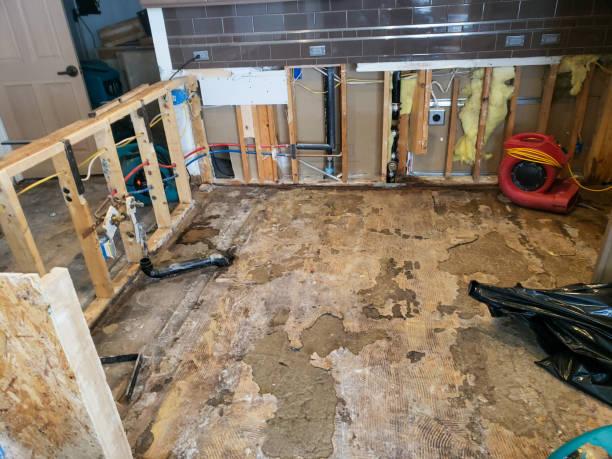What Are the Best Ways to Protect Your Home from Water Damage?

Water can be one of the most destructive forces in a home. From small leaks to major flooding, damage from excess moisture often leads to costly repairs and long-term structural issues if not handled correctly. Knowing how to protect your home can help you avoid the stress and expense of unexpected disasters.
Whether you're a homeowner or property manager, understanding key strategies for water damage mitigation & restoration is essential in 2025. Acting early saves time, money, and the structural integrity of your home.
Understand the Sources of Water Intrusion
To prevent water damage to your home, it’s essential to understand where the most common problems typically begin. Issues often start with leaky roofs or damaged flashing, which can allow unwanted moisture to seep into your home’s structure. Broken or aging pipes hidden within walls or under floors can go unnoticed for months, slowly compromising surrounding materials. Faulty appliances—such as dishwashers, washing machines, and even refrigerators—can develop small leaks that grow into major concerns if left unaddressed. Clogged gutters and downspouts prevent proper drainage, causing overflow that may damage siding, insulation, or even the foundation.
Poor grading around the home also directs excess runoff toward the structure rather than away from it, putting unnecessary strain on your property. Additionally, natural elements like storm surges and flash flooding—particularly common in coastal areas like Kemah, TX pose a significant threat to homes, especially those without adequate drainage systems or reinforcement. Each of these issues can lead to expensive repair needs if ignored. Regular inspections, seasonal maintenance, and timely fixes are your best defense against these preventable complications.
Preventative Measures You Can Take
Protecting your property doesn’t always require major renovations. Simple steps can make a big difference:
-
Install a sump pump in basements and low-lying areas.
-
Use water leak detectors under sinks and behind appliances.
-
Keep gutters clean and redirect downspouts away from your foundation.
-
Inspect caulking and seals around windows and doors annually.
-
Insulate exposed pipes to prevent freezing and bursting.
Taking these proactive steps helps avoid the need for major flood damage restoration later
What to Do When Water Damage Happens
Even with precautions, accidents happen. Quick action is crucial when you discover water damage. Here's what to do:
-
Shut off the water source (if applicable).
-
Turn off electricity in affected areas.
-
Move valuables and furniture to a dry space.
-
Begin ventilation by opening windows and using fans.
-
Contact a professional for help with water removal and drying.
Hiring a water damage restoration company ensures the area is fully dried, sanitized, and restored to prevent further issues like mold growth.
Why Timely Restoration Matters
The longer water sits, the worse the damage gets. Within hours, porous materials like drywall and flooring begin to deteriorate. In less than 48 hours, mold can start forming.
Professionals use advanced tools such as industrial air movers and moisture meters to speed up water extraction and drying. If the problem is caused by a storm or burst pipe, you may also require storm damage restoration or plumbing repair services.
For those in areas like Kemah, TX, humidity and coastal weather add an extra layer of risk, making quick response even more important.
Choosing the Right Help
Not all professionals offer the same quality of work. When searching for water damage restoration near me, be sure to choose licensed and insured companies with strong reviews and 24/7 emergency support.
One trusted name in the region is Bulldog Restoration & Cleaning LLC—a team known for thorough inspection, expert cleanup, and long-term solutions that give homeowners peace of mind.
Final Thoughts
Preventing damage starts with awareness and regular upkeep. But when issues do arise, quick, professional action is the key to avoiding major damage and expensive repairs. Whether you're dealing with flooding, burst pipes, or hidden leaks, knowing how to respond—and who to call—makes all the difference. Stay informed, stay prepared, and keep your home protected from the unexpected. Early intervention can save structural materials from irreversible harm. Moisture left unchecked often leads to unhealthy indoor conditions. Working with experienced professionals ensures complete restoration and long-term peace of mind.
FAQs
1. What’s the first step in water damage mitigation?
Turn off the water source and electricity in the affected area, then call a professional to start immediate water removal and drying.
2. How soon should restoration begin after water damage?
Ideally, within 24–48 hours to prevent mold growth and structural damage.
3. What’s the difference between mitigation and restoration?
Mitigation stops further damage (like drying and cleanup), while restoration involves rebuilding damaged areas.
4. Can I handle water damage cleanup on my own?
Small spills can be managed, but larger issues require a water damage restoration company to ensure safety and thorough drying.
5. How do I prevent mold after a water incident?
Ensure all moisture is removed, use dehumidifiers, and consider professional help with mold prevention after water damage.

- Seo
- Art
- Causes
- Crafts
- Dance
- Drinks
- Film
- Fitness
- Food
- الألعاب
- Gardening
- Health
- الرئيسية
- Literature
- Music
- Networking
- أخرى
- Party
- Religion
- Shopping
- Sports
- Theater
- Wellness
- Business & Money

